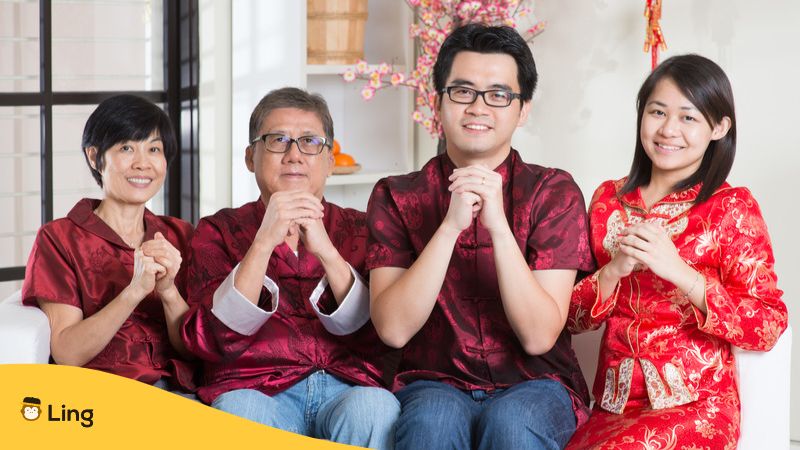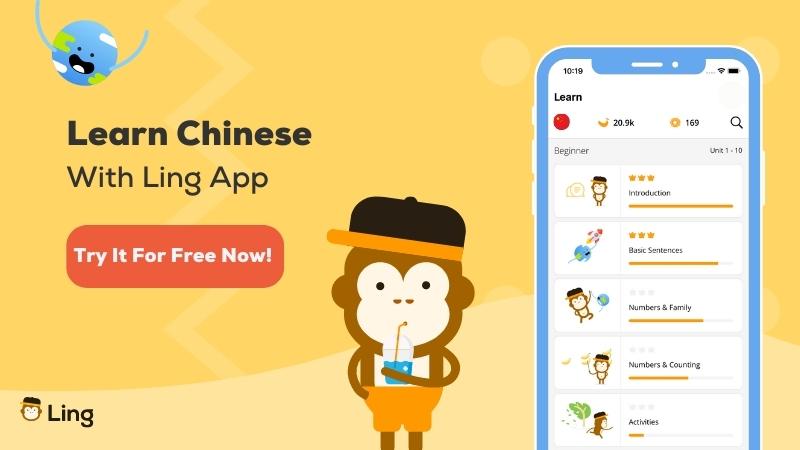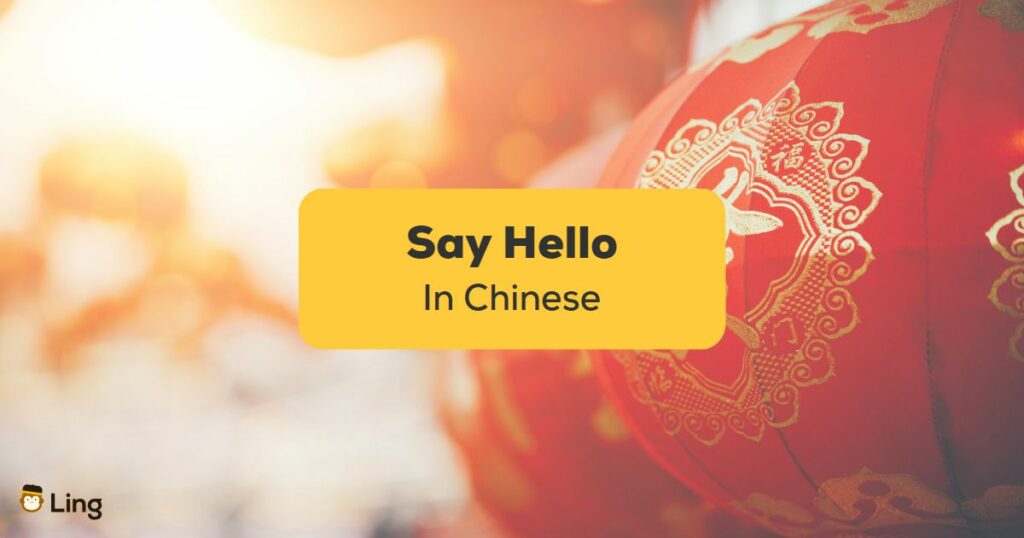You finally decided to learn the Chinese language but don’t know where to start. Let me help you there! Greetings are always the first topic to learn in a new foreign language. Because greeting people is something we do every single day and they are a great way to start a conversation.
Just keep reading to learn ten common ways to say hello in Chinese and get ready to surprise your Chinese friends with an authentic greeting!
Page Contents:
- How To Say Hello In Chinese?
- Formal Ways To Say Hello In Chinese
- Informal Ways To Say Hello In Chinese
- Do Chinese People Greet Each Other With A Bow?
- Other Chinese Greetings You Must Know
- Summary
- Start Learning Chinese With Ling!
How To Say Hello In Chinese?
The most common way to say hello in Chinese is 你好 (nǐ hǎo). It’s a neutral phrase used in daily life.
Even though it is a common and basic greeting among Chinese learners, there are more phrases to learn! Native Chinese speakers use many different – and some are even interesting when translated – phrases to say hello.
You’ll learn several Chinese greetings, some of which are formal and informal in the rest of this article. Let’s move on to the formal ways to say hello in Chinese!

Formal Ways To Say Hello In Chinese
Here are the two commonly used formal greetings to say hello to someone in Chinese. You can greet someone you meet for the first time, who is senior or older than you with these phrases.
Hello – 您好 (Nín Hǎo)
This is similar to 你好 (nǐ hǎo) but it’s a more polite and formal phrase. What makes this phrase polite is 您 (nín) which is the formal “you” form in Chinese. You use it when talking to older people or people you have respect for.
I must say that the older and traditional Chinese people will be impressed if you use the 您 (nín) here.
Hello, Nice To Meet You – 久仰 (Jiǔyǎng)
This can be the politest way to say hello in China. It literally means “I have been looking forward to meeting you for a long time.” However, this phrase is commonly used when meeting someone for the first time.
It’s not a common phrase among friends since it’s a formal greeting.
Informal Ways To Say Hello In Chinese
Here are some common greetings you can use with your friends in casual situations.
Hello Everyone – 大家好 (Dàjiā Hǎo)
You can use this phrase when greeting a group of people in Chinese. The literal translation would be “everyone good?” and it is a good alternative to 你好 (nǐ hǎo).
Remember that Chinese people don’t use 大家好 (dàjiā hǎo) when greeting only two people, but it wouldn’t be totally wrong though. But make sure to only use 大家好 (dàjiā hǎo) when greeting three or more people just to be safe!
Hello Everyone – 你们好 (Nǐmen Hǎo)
Just like the greeting above, this Chinese greeting is used to say hello to a group of people.
In contrast to the phrase above, you can use 你们好 (nǐmen hǎo) to greet only two people, but it doesn’t a big deal if you use it for bigger groups as well. In that case, the only person who can correct you would be a Chinese teacher.
Compared to the phrase above, you’re more likely to hear 大家好 (dàjiā hǎo) since it is a bit less formal.
Have You Eaten? – 你吃了吗? (Nǐ Chī Le Ma?)
Well, this is the interesting phrase I was talking about at the beginning of the article. The literal translation of this phrase is “have you eaten?”
Don’t be surprised but this is one of the most commonly used phrases to say hi in Chinese. Native speakers use it very often but they sometimes may actually ask you if you’ve eaten your dinner or not. But it’s more likely that they’re just greeting you.
You can respond with 吃了 (chīle) “I have” to say hi back in the same manner.
Hello – 喂 (Wéi)
Chinese people use this phrase only when picking up the phone. So you can’t say 喂 (wéi) to greet someone when you’re face to face.
What’s Up – 怎么了 (Zěnmeliǎo)
This Chinese greeting is mostly used among friends and young people and it’s very informal. You won’t hear older people using this phrase and they may not understand it as well, and even get offended if you say 怎么了 (zěnmeliǎo) to them.
Hello – 哈罗 (Hā Luō)
哈罗 (hā luō) is the Chinese version – transliteration – of “hello” in English. See how this one is almost the same in pronunciation? Some Chinese people love to come up with transliterations of English words and incorporate them into their own language in the best way possible.
Long Time No See! – 好久不见 (Hǎojiǔ Bùjiàn)
As in English, you’d use this phrase to start a conversation with an old friend or someone you haven’t seen in a while. After saying 好久不见 (hǎojiǔ bùjiàn), you should keep the conversation going by asking how have they been and what they have done in that long time!

Do Chinese People Greet Each Other With A Bow?
Many outsider people mistake Chinese culture for the Japanese and this is one of them. The answer is NO! You don’t need to bow when greeting people in China. Bowing is not a part of modern Chinese culture.
But still, you can see Chinese people do a slight nod or bow when they’re apologizing, like 抱歉 (bàoqiàn).
Other Chinese Greetings You Must Know
Here are other basic greeting phrases to greet people at different times of the day and ask about them. To see the full list of Chinese greetings in detail, head straight to our previous blog post!
Summary
Great! It looks like you’ve completed your first step to learning Chinese. You’ve learned formal and informal ways to say hello in Chinese! Here is a quick summary list of what we’ve covered in this article.
| English | Chinese | Pinyin | Formality |
|---|---|---|---|
| What’s up? | 怎么了 | Zěnmeliǎo | The most casual |
| Hello. | 哈喽 | Hā lóu | Casual |
| Hello. | 你好 | Nǐ hǎo | Neutral |
| Hello. | 您好 | Nín hǎo | Formal |
| Pleased to meet you. | 幸会 | Xìng huì | More formal |
| I’ve long heard your well-known name. | 久闻大名 | Jiǔ wén dàmíng | The most formal |
If you want to keep learning practical Chinese, take a look at Ling! Read below to get information about our app!
Start Learning Chinese With Ling!
If you want to learn Chinese or other 60+ languages offered in the app, Ling is here for you!

Ling provides access to over 60 languages, including Chinese! Download the app on your mobile device to gain instant access to a large amount of knowledge about the Chinese language and vocabulary.
To quickly catch up when hearing native speakers, you can look at Chinese characters and listen to audio of their accents. The games, quizzes, and chatbots we provide are just the icing on the cake. Consequently, the most engaging resources for studying Chinese will be a joy.
Plus, don’t forget to visit Ling’s Chinese blog weekly to learn more about Chinese culture and language!
Most Chinese learners chose Ling to help them succeed, so why not join them? Download the Ling app from Google Play Store and Apple App Store now, and start learning Chinese at your own pace!



































































